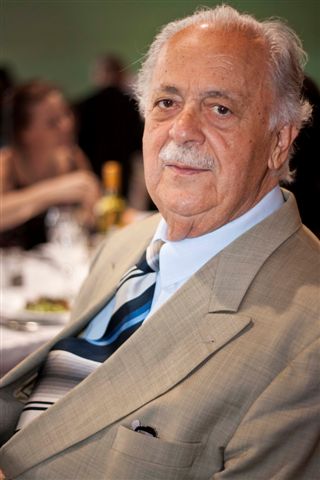
Advocate George Bizos took the podium on the evening of 8 April during the Graduation ceremonies of the Law, Pharmacy and Education Faculties to receive an Honorary Doctorate from Rhodes. His speech, on Human Rights, imparted invaluable advice to the young lawyers graduating that evening.
“I graduated in 1953 at Wits together with 17 others. My alma mater proudly held itself out as an open university. There was only one black man and no women among us. The composition of the student bodies in Rhodes, Cape Town and Natal were substantially similar.
“Happily it is no longer so at any of the universities in South Africa because of the advent of the democratic state and the adoption of a Bill of Rights as part of its Constitution.” Here he looked sternly around the auditorium, and shook his head. “And yet some say that nothing has changed.”
With the brief statement that human rights are by no means a recent invention, Advocate Bizos explored the various Charters and Declarations which were made in the middle of the twentieth century, including the Atlantic Charter, adopted in 1941, the African Demands by the ANC in 1943 and the Freedom Charter in 1955.
The Atlantic Charter was adopted in the early years of World War II and, says Adv Bizos, it promised that the war would be a war to end all wars, and that colonialism would come to an end. The adoption of the UN Charter and the Universal Declaration of Human Rights in the mid and late 1940s created great expectations among the African people.
Fifty years later, in 1995, the South African Constitution was enacted by more than 80% of democratically elected parliamentary representatives and certified by the Constitutional Court as compliant with the 34 democratic principles agreed to by the delegates of more than 20 political parties and other organisations at the 1993 negotiation forum known as Codesa.
Adv Bizos recalls a visit to Codesa by Nelson Mandela, where he advised the committee drafting the proposed Bill of Rights and Constitution for a united democratic state, that the Constitution needed to be good for all the people of South Africa, not merely one political party, or a single ethnic or tribal group. It needed to also make provision for a party which lost at one election to be able to win the next. His view prevailed, but, says Adv Bizos:
“It is not cast in stone. A number of amendments have been adopted by the necessary two-thirds majority. None of the foundational principles have been altered. We must all make sure that they are not.”
Adv Bizos acknowledged that legitimate grievances exist in relation to the lack of delivery, elimination of poverty, lack of educational and health services and the absence of adequate housing and employment opportunities. However, those who argue that it is partly the fault of the Constitution that these promises have not been delivered are misguided. Trying, over a sixteen year period, to wipe out the injustices perpetrated over three centuries has proved to be a greater task than anticipated.
Moving to look at the Constitutive Act of the African Union, Adv Bizos gave a scathing indictment of the states within in the Union who are not implementing the provision. He then appealed directly to the graduates to help those who cannot afford to follow them into higher education, as justice for all cannot be obtained until those who can help the less fortunate undertake to do so. Again speaking directly to the graduates, Adv Bizos finished with the following statement:
“I believe that your generation will reject the fatuous reasons often advanced for abrogating the rights of freedom, equality and dignity of all the people in our world. We should not accept that the main principles of democracy are mere words. We should insist that Human Rights should be respected, promoted and obeyed. The Executive or the Legislature have no right to interpret them. That is the function of independent courts. I am confident that your generation will do better than mine.”
Full speech click here
Citation click here
Story by Jean Mckeowin
Photo by Sophie Smith
